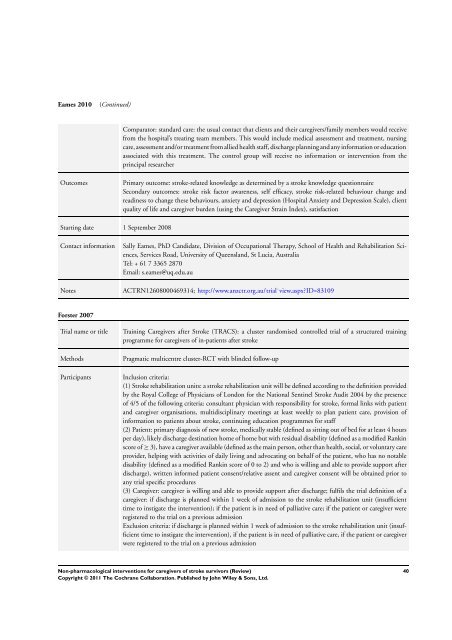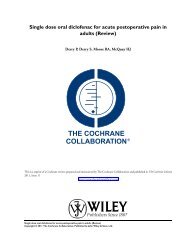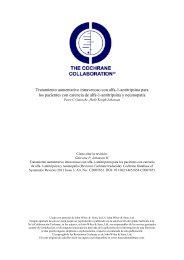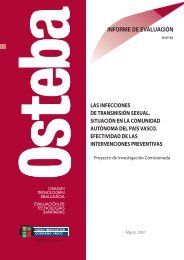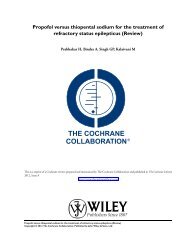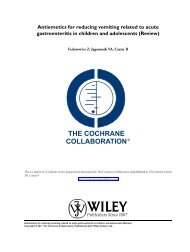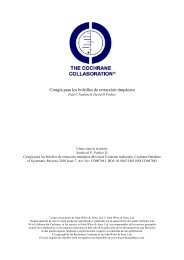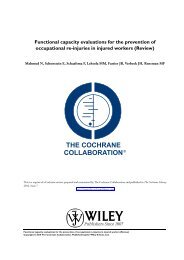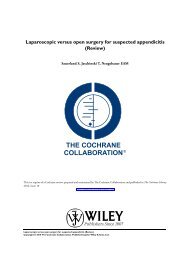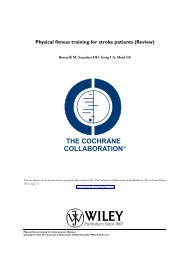Non-pharmacological interventions for caregivers ... - Update Software
Non-pharmacological interventions for caregivers ... - Update Software
Non-pharmacological interventions for caregivers ... - Update Software
Create successful ePaper yourself
Turn your PDF publications into a flip-book with our unique Google optimized e-Paper software.
Eames 2010 (Continued)<br />
Comparator: standard care: the usual contact that clients and their <strong>caregivers</strong>/family members would receive<br />
from the hospital’s treating team members. This would include medical assessment and treatment, nursing<br />
care, assessment and/or treatment from allied health staff, discharge planning and any in<strong>for</strong>mation or education<br />
associated with this treatment. The control group will receive no in<strong>for</strong>mation or intervention from the<br />
principal researcher<br />
Outcomes Primary outcome: stroke-related knowledge as determined by a stroke knowledge questionnaire<br />
Secondary outcomes: stroke risk factor awareness, self efficacy, stroke risk-related behaviour change and<br />
readiness to change these behaviours, anxiety and depression (Hospital Anxiety and Depression Scale), client<br />
quality of life and caregiver burden (using the Caregiver Strain Index), satisfaction<br />
Starting date 1 September 2008<br />
Contact in<strong>for</strong>mation Sally Eames, PhD Candidate, Division of Occupational Therapy, School of Health and Rehabilitation Sciences,<br />
Services Road, University of Queensland, St Lucia, Australia<br />
Tel: + 61 7 3365 2870<br />
Email: s.eames@uq.edu.au<br />
Notes ACTRN12608000469314; http://www.anzctr.org.au/trial˙view.aspx?ID=83109<br />
Forster 2007<br />
Trial name or title Training Caregivers after Stroke (TRACS): a cluster randomised controlled trial of a structured training<br />
programme <strong>for</strong> <strong>caregivers</strong> of in-patients after stroke<br />
Methods Pragmatic multicentre cluster-RCT with blinded follow-up<br />
Participants Inclusion criteria:<br />
(1) Stroke rehabilitation units: a stroke rehabilitation unit will be defined according to the definition provided<br />
by the Royal College of Physicians of London <strong>for</strong> the National Sentinel Stroke Audit 2004 by the presence<br />
of 4/5 of the following criteria: consultant physician with responsibility <strong>for</strong> stroke, <strong>for</strong>mal links with patient<br />
and caregiver organisations, multidisciplinary meetings at least weekly to plan patient care, provision of<br />
in<strong>for</strong>mation to patients about stroke, continuing education programmes <strong>for</strong> staff<br />
(2) Patient: primary diagnosis of new stroke, medically stable (defined as sitting out of bed <strong>for</strong> at least 4 hours<br />
per day), likely discharge destination home of home but with residual disability (defined as a modified Rankin<br />
score of ≥ 3), have a caregiver available (defined as the main person, other than health, social, or voluntary care<br />
provider, helping with activities of daily living and advocating on behalf of the patient, who has no notable<br />
disability (defined as a modified Rankin score of 0 to 2) and who is willing and able to provide support after<br />
discharge), written in<strong>for</strong>med patient consent/relative assent and caregiver consent will be obtained prior to<br />
any trial specific procedures<br />
(3) Caregiver: caregiver is willing and able to provide support after discharge; fulfils the trial definition of a<br />
caregiver: if discharge is planned within 1 week of admission to the stroke rehabilitation unit (insufficient<br />
time to instigate the intervention); if the patient is in need of palliative care; if the patient or caregiver were<br />
registered to the trial on a previous admission<br />
Exclusion criteria: if discharge is planned within 1 week of admission to the stroke rehabilitation unit (insufficient<br />
time to instigate the intervention), if the patient is in need of palliative care, if the patient or caregiver<br />
were registered to the trial on a previous admission<br />
<strong>Non</strong>-<strong>pharmacological</strong> <strong>interventions</strong> <strong>for</strong> <strong>caregivers</strong> of stroke survivors (Review)<br />
Copyright © 2011 The Cochrane Collaboration. Published by John Wiley & Sons, Ltd.<br />
40


